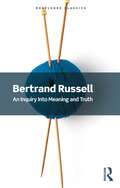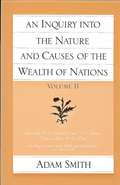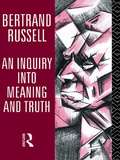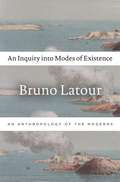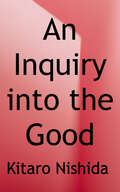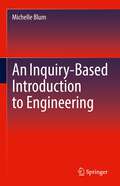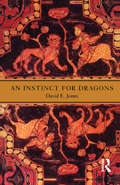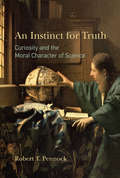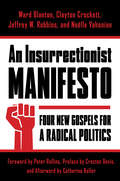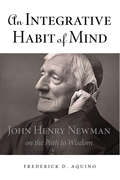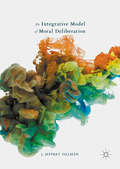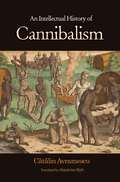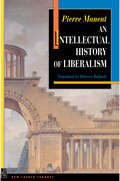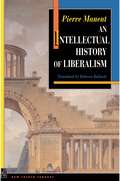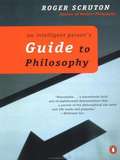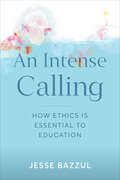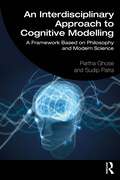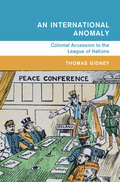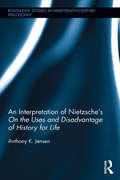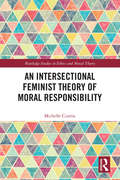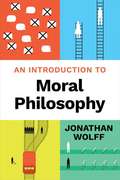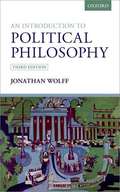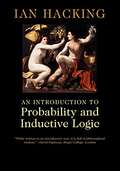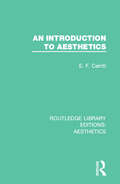- Table View
- List View
An Inquiry Into Meaning and Truth (Routledge Classics)
by Bertrand RussellIn An Inquiry Into Meaning and Truth, Bertrand Russell returns to philosophy after a long period of writing about education, religion and marriage. Investigating how we can be justified in what we know and how we can reconcile knowledge of the physical world with immediate sensory knowledge, Russell sets out to reconcile the various aspects of his thought since his early logicist period—the view that mathematical truths are ultimately logical truths.Russell's goal is to stress-test empiricism in light of contemporary developments in logic and language or, as Russell himself succinctly puts it, "to combine a general outlook akin to Hume's with the methods that have grown out of modern logic". His quest combines three strands: metaphysical, epistemological and linguistic.Both a fascinating insight into Russell’s evolving views and the continuity of his thinking over the years, it also foreshadows many future debates which came to occupy centre stage within English-speaking philosophy: debates about realism and anti-realism, the viability of pragmatism as a philosophical theory and the perennial opposition between holism and atomism.This Routledge Classics edition includes a new Foreword by Pascal Engel, placing Russell's book in helpful philosophical context.
An Inquiry Into The Nature And Causes Of The Wealth Of Nations Volume 2
by Adam Smith R. H. Campbell A. S. Skinner W. B. ToddFirst published in 1776, the year in which the American Revolution officially began, Smith's Wealth of Nations sparked a revolution of its own. In it Smith analyzes the major elements of political economy, from market pricing and the division of labor to monetary, tax, trade, and other government policies that affect economic behavior. Throughout he offers seminal arguments for free trade, free markets, and limited government. Criticizing mercantilists who sought to use the state to increase their nations' supply of precious metals, Smith points out that a nation's wealth should be measured by the well-being of its people. Prosperity in turn requires voluntary exchange of goods in a peaceful, well-ordered market. How to establish and maintain such markets? For Smith the answer lay in man's social instincts, which government may encourage by upholding social standards of decency, honesty, and virtue, but which government undermines when it unduly interferes with the intrinsically private functions of production and exchange.
An Inquiry into Meaning and Truth
by Bertrand RussellBertrand Russell is concerned in this book with the foundations of knowledge. He approaches his subject through a discussion of language, the relationships of truth to experience and an investigation into how knowledge of the structure of language helps our understanding of the structure of the world. This edition includes a new introduction by Thomas Baldwin, Clare College, Cambridge
An Inquiry into Modes of Existence: An Anthropology of the Moderns
by Bruno LatourIn this new book, Bruno Latour offers answers to questions raised in We Have Never Been Modern, a work that interrogated the connections between nature and culture. If not modern, he asked, what have we been, and what values should we inherit? Over the past twenty-five years, Latour has developed a research protocol different from the actor-network theory with which his name is now associated--a research protocol that follows the different types of connectors that provide specific truth conditions. These are the connectors that prompt a climate scientist challenged by a captain of industry to appeal to the institution of science, with its army of researchers and mountains of data, rather than to "capital-S Science" as a higher authority. Such modes of extension--or modes of existence, Latour argues here--account for the many differences between law, science, politics, and other domains of knowledge. Though scientific knowledge corresponds to only one of the many possible modes of existence Latour describes, an unrealistic vision of science has become the arbiter of reality and truth, seducing us into judging all values by a single standard. Latour implores us to recover other modes of existence in order to do justice to the plurality of truth conditions that Moderns have discovered throughout their history. This systematic effort of building a new philosophical anthropology presents a completely different view of what Moderns have been, and provides a new basis for opening diplomatic encounters with other societies at a time when all societies are coping with ecological crisis. Translated by Catherine Porter.
An Inquiry into the Good
by Kitaro NishidaThis book represented the foundation of Nishida's philosophy--reflecting both his deep study of Zen Buddhism and his thorough analysis of Western philosophy--and established its author as the foremost Japanese philosopher of this century. <p><p>In this important new translation, two scholars--one Japanese and one American--have worked together to present a lucid and accurate rendition of Nishida's ideas.
An Inquiry-Based Introduction to Engineering
by Michelle BlumThe text introduces engineering to first-year undergraduate students using Inquiry-Based Learning (IBL). It draws on several different inquiry-based instruction types such as confirmation inquiry, structured inquiry, guided inquiry, and open inquiry, and all of their common elements. Professor Blum’s approach emphasizes the student’s role in the learning process, empowering them in the classroom to explore the material, ask questions, and share ideas, instead of the instructor lecturing to passive learners about what they need to know. Beginning with a preface to IBL, the book is organized into three parts, each consisting of four to ten chapters. Each chapter has a dedicated topic where an initial few paragraphs of introductory or fundamental material are provided. This is followed by a series of focused questions that guide the students’ learning about the concept(s) being taught. Featuring multiple inquiry-based strategies, each most appropriate to the topic, An Inquiry-Based Approach to Introduction to Engineering stands as an easy to use textbook that quickly allows students to actively engage with the content during every class period.
An Instinct for Dragons
by David E. JonesFirst published in 2002. The image of a dragon- magnificent, terrifying, voracious and powerful- is ingrained in our culture. But where di it originate? And how is that people from Africa to China to America picture it the same? An Instinct for Dragons is anthropologist David E. Jones' account of his search for the mysterious birth of this ubiquitous monster. Nit only does virtually every culture in the world have a name for dragons- smok in Polish, tatsu in Japanese, unktena in Cherokee- but dragons everywhere share many of the same characteristics: multiple heads, blazing eyes, earth-shaking roars, fiery breath, and the abduction of princesses. Spanning dragon lore from all paces and periods, Jones scrutinizes sightings and references from dragon inscriptions on cave walls, cliffs and pots to the Loch Ness monster to the Internet. Jones' research is erudite, and his conclusion is stunning; not only is our fear and fascination with dragons a direct result of the predators who threatened our evolution, but humankind is essentially 'hardwired' to believe in the dragon. This book will fascinate any reader interested in the cultural history of this most venerable of monsters.
An Instinct for Truth: Curiosity and the Moral Character of Science (The\mit Press Ser.)
by Robert T. PennockAn exploration of the scientific mindset—such character virtues as curiosity, veracity, attentiveness, and humility to evidence—and its importance for science, democracy, and human flourishing.Exemplary scientists have a characteristic way of viewing the world and their work: their mindset and methods all aim at discovering truths about nature. In An Instinct for Truth, Robert Pennock explores this scientific mindset and argues that what Charles Darwin called “an instinct for truth, knowledge, and discovery” has a tacit moral structure—that it is important not only for scientific excellence and integrity but also for democracy and human flourishing. In an era of “post-truth,” the scientific drive to discover empirical truths has a special value.Taking a virtue-theoretic perspective, Pennock explores curiosity, veracity, skepticism, humility to evidence, and other scientific virtues and vices. He explains that curiosity is the most distinctive element of the scientific character, by which other norms are shaped; discusses the passionate nature of scientific attentiveness; and calls for science education not only to teach scientific findings and methods but also to nurture the scientific mindset and its core values.Drawing on historical sources as well as a sociological study of more than a thousand scientists, Pennock's philosophical account is grounded in values that scientists themselves recognize they should aspire to. Pennock argues that epistemic and ethical values are normatively interconnected, and that for science and society to flourish, we need not just a philosophy of science, but a philosophy of the scientist.
An Insurrectionist Manifesto: Four New Gospels for a Radical Politics
by Jeffrey W. Robbins Clayton Crockett Ward Blanton Catherine Keller Noëlle VahanianAn Insurrectionist Manifesto contains four insurrectionary gospels based on Martin Heidegger's philosophical model of the fourfold: earth and sky, gods and mortals. Challenging religious dogma and dominant philosophical theories, they offer a cooperative, world-affirming political theology that promotes new life through not resurrection but insurrection.The insurrection in these gospels unfolds as a series of miraculous yet worldly practices of vital affirmation. Since these routines do not rely on fantasies of escape, they engender intimate transformations of the self along the very coordinates from which they emerge. Enacting a comparative and contagious postsecular sensibility, these gospels draw on the work of Slavoj Žižek, Giorgio Agamben, Catherine Malabou, Francois Laruelle, Peter Sloterdijk, and Gilles Deleuze yet rejuvenate scholarship in continental philosophy, critical race theory, the new materialisms, speculative realism, and non-philosophy. They think beyond the sovereign force of the one to initiate a radical politics "after" God.
An Insurrectionist Manifesto: Four New Gospels for a Radical Politics (Insurrections: Critical Studies in Religion, Politics, and Culture)
by Clayton Crockett Ward Blanton Jeffrey Robbins Noëlle VahanianAn Insurrectionist Manifesto contains four insurrectionary gospels based on Martin Heidegger's philosophical model of the fourfold: earth and sky, gods and mortals. Challenging religious dogma and dominant philosophical theories, they offer a cooperative, world-affirming political theology that promotes new life through not resurrection but insurrection. The insurrection in these gospels unfolds as a series of miraculous yet worldly practices of vital affirmation. Since these routines do not rely on fantasies of escape, they engender intimate transformations of the self along the very coordinates from which they emerge. Enacting a comparative and contagious postsecular sensibility, these gospels draw on the work of Slavoj i ek, Giorgio Agamben, Catherine Malabou, François Laruelle, Peter Sloterdijk, and Gilles Deleuze yet rejuvenate scholarship in continental philosophy, critical race theory, the new materialisms, speculative realism, and nonphilosophy. They think beyond the sovereign force of the one to initiate a radical politics "after" God.
An Integrative Habit of Mind: John Henry Newman on the Path to Wisdom
by Frederick AquinoSearching for better ways to inspire people to pursue wisdom, Frederick D. Aquino argues that teachers and researchers should focus less on state-of-the-art techniques and learning outcomes and instead pay more attention to the intellectual formation of their students. We should, Aquino contends, encourage the development of an integrative habit of mind, which entails cultivating the capacity to grasp how various pieces of data and areas of inquiry fit together and to understand how to apply this information to new situations. To fully explore this notion, An Integrative Habit of Mind brings the work of the great religious figure and educator John Henry Newman into fruitful conversation with recent philosophical developments in epistemology, cognition, and education. Aquino unearths some crucial but neglected themes from NewmanÆs writings and carries them forward into the contemporary context, revealing how his ideas can help us broaden our horizons, render apt judgments, and better understand our world and how we think about it.
An Integrative Model of Moral Deliberation
by J. Jeffrey TillmanAn Integrative Model of Moral Deliberation suggests that the inadequacy of models of moral deliberation to deal effectively with contemporary moral complexity is a result of the lack of an inadequate theory of moral cognition. Drawing from work in neuroscience, evolutionary psychology, social theory, dual process cognitive theory, and the work of William James, this book develops a theory of moral cognition to be used as the basis for a model of moral deliberation. This model portrays moral deliberation as a back and forth movement between intuitive and analytic cognitions, by which narrative scenarios are constructed and then assessed by aesthetic sensibilities.
An Intellectual History of Cannibalism
by Cătălin AvramescuThe cannibal has played a surprisingly important role in the history of thought--perhaps the ultimate symbol of savagery and degradation-- haunting the Western imagination since before the Age of Discovery, when Europeans first encountered genuine cannibals and related horrible stories of shipwrecked travelers eating each other. An Intellectual History of Cannibalism is the first book to systematically examine the role of the cannibal in the arguments of philosophers, from the classical period to modern disputes about such wide-ranging issues as vegetarianism and the right to private property. Catalin Avramescu shows how the cannibal is, before anything else, a theoretical creature, one whose fate sheds light on the decline of theories of natural law, the emergence of modernity, and contemporary notions about good and evil. This provocative history of ideas traces the cannibal's appearance throughout Western thought, first as a creature springing from the menagerie of natural law, later as a diabolical retort to theological dogmas about the resurrection of the body, and finally to present-day social, ethical, and political debates in which the cannibal is viewed through the lens of anthropology or invoked in the service of moral relativism. Ultimately, An Intellectual History of Cannibalism is the story of the birth of modernity and of the philosophies of culture that arose in the wake of the Enlightenment. It is a book that lays bare the darker fears and impulses that course through the Western intellectual tradition.
An Intellectual History of Liberalism
by Pierre Manent Rebecca BalinskiHighlighting the social tensions that confront the liberal tradition, Pierre Manent draws a portrait of what we, citizens of modern liberal democracies, have become. For Manent, a discussion of liberalism encompasses the foundations of modern society, its secularism, its individualism, and its conception of rights. The frequent incapacity of the morally neutral, democratic state to further social causes, he argues, derives from the liberal stance that political life does not serve a higher purpose. Through quick-moving, highly synthetic essays, he explores the development of liberal thinking in terms of a single theme: the decline of theological politics. The author traces the liberal stance to Machiavelli, who, in seeking to divorce everyday life from the pervasive influence of the Catholic church, separated politics from all notions of a cosmological order. What followed, as Manent demonstrates in his analyses of Locke, Hobbes, Rousseau, Guizot, and Constant, was the evolving concept of an individual with no goals outside the confines of the self and a state with no purpose but to prevent individuals from dominating one another. Weighing both the positive and negative effects of such a political arrangement, Manent raises important questions about the fundamental political issues of the day, among them the possibility of individual rights being reconciled with the necessary demands of political organization, and the desirability of a government system neutral about religion but not about public morals.
An Intellectual History of Liberalism (New French Thought Series #1)
by Pierre ManentHighlighting the social tensions that confront the liberal tradition, Pierre Manent draws a portrait of what we, citizens of modern liberal democracies, have become. For Manent, a discussion of liberalism encompasses the foundations of modern society, its secularism, its individualism, and its conception of rights. The frequent incapacity of the morally neutral, democratic state to further social causes, he argues, derives from the liberal stance that political life does not serve a higher purpose. Through quick-moving, highly synthetic essays, he explores the development of liberal thinking in terms of a single theme: the decline of theological politics. The author traces the liberal stance to Machiavelli, who, in seeking to divorce everyday life from the pervasive influence of the Catholic church, separated politics from all notions of a cosmological order. What followed, as Manent demonstrates in his analyses of Locke, Hobbes, Rousseau, Guizot, and Constant, was the evolving concept of an individual with no goals outside the confines of the self and a state with no purpose but to prevent individuals from dominating one another. Weighing both the positive and negative effects of such a political arrangement, Manent raises important questions about the fundamental political issues of the day, among them the possibility of individual rights being reconciled with the necessary demands of political organization, and the desirability of a government system neutral about religion but not about public morals.
An Intelligent Person's Guide to Philosophy
by Roger Scruton"Philosophy's the 'love of wisdom', can be approached in two ways: by doing it, or by studying how it has been done," so writes the eminent philosopher Roger Scruton. In this user-friendly book, he chooses to introduce philosophy by doing it. Taking the discipline beyond theory and "intellectualism," he presents it in an empirical, accessible, and practical light. The result is not a history of the field but a vivid, energetic, and personal account to guide the reader making his or her own venture into philosophy. Addressing a range of subjects from freedom, God, reality, and morality, to sex, music, and history, Scruton argues philosophy's relevance not just to intellectual questions, but to contemporary life. .
An Intense Calling: How Ethics Is Essential to Education
by Jesse BazzulPositing that education is a movement from one way of being to another, more desirable one, An Intense Calling argues that ethics should be the prime focus for the field of education. The book locates ethics, education, and justice in human subjectivity and describes education as a necessary practice for ethical reflexivity, change, and becoming (ethically) different. It also situates ethics as something that exceeds subjectivity, thereby engaging ethics as a material phenomenon through topics such as aesthetics and solidarity with non-humans. Jesse Bazzul explores various concepts in the book including power, biopolitics, the commons, subjectivity, and materiality, and draws from over twenty years of experience teaching in different countries including Canada, Ireland, the United States, China, and Ukraine. Taking a wide-ranging philosophical approach, the book entangles ethics, urgent political issues, and pressing educational contexts of the twenty-first century. In doing so, An Intense Calling maintains that ethics is the core of education because education involves finding better ways of living and being in the world.
An Interdisciplinary Approach to Cognitive Modelling: A Framework Based on Philosophy and Modern Science
by Partha Ghose Sudip PatraAn Interdisciplinary Approach to Cognitive Modelling presents a new approach to cognition that challenges long-held views. It systematically develops a broad-based framework to model cognition, which is mathematically equivalent to the emerging ‘quantum-like modelling’ of the human mind. The book argues that a satisfactory physical and philosophical basis of such an approach is missing, a particular issue being the application of quantization to the mind for which there is no empirical evidence as yet. In response to this issue, the book adopts a COM (classical optical modelling) approach, broad-based but mathematically equivalent to quantum-like modelling while avoiding its problematic features. It presents a philosophically informed and empirically motivated mathematical model of cognition, mainly concerning decision-making processes. It also deals with applications to different areas of the social sciences. It will be of interest to scholars and research students interested in the mathematical modelling of cognition and decision-making, and also interdisciplinary researchers interested in broader issues of cognition.
An International Anomaly: Colonial Accession to the League of Nations (Global and International History)
by Thomas GidneyIt is often assumed that only sovereign states can join the United Nations. But this was not always the case. At the founding of the United Nations, a loophole drafted by British statesmen in its predecessor organisation, the League of Nations, was carried forward, allowing colonies to accede as member-states. Colonies such as India, Ireland, Egypt, and many more were afforded a tokenistic representation at the League in Geneva during the interwar years, decades before their independence. Thomas Gidney unites three geographically distinct case studies to demonstrate the evolution of Britain's policy from a range of different viewpoints, exploring how this policy came into being, and why it was only exploited by the British Empire. He argues that this membership shaped colonial norms around sovereignty and international recognition in the interwar period and to the present day. This title is also available as open access on Cambridge Core.
An Interpretation of Nietzsche's On the Uses and Disadvantage of History for Life (Routledge Studies in Nineteenth-Century Philosophy)
by Anthony K. JensenWith his An Interpretation of Nietzsche’s "On the Uses and Disadvantage of History for Life", Anthony K. Jensen shows how 'timely' Nietzsche’s second "Untimely Meditation" really is. This comprehensive and insightful study contextualizes and analyzes a wide range of Nietzsche’s earlier thoughts about history: teleology, typology, psychology, memory, classical philology, Hegelianism, and the role historiography plays in modern culture. On the Uses and Disadvantage of History for Life is shown to be a ‘timely’ work, too, insofar as it weaves together a number of Nietzsche's most important influences and thematic directions at that time: ancient culture, science, epistemology, and the thought of Schopenhauer and Burckhardt. Rather than dismiss it as a mere ‘early’ work, Jensen shows how the text resonates in Nietzsche’s later perspectivism, his theory of subjectivity, and Eternal Recurrence. And by using careful philological analysis of the text’s composition history, Jensen is in position to fully elucidate and evaluate Nietzsche’s arguments in their proper contexts. As such Jensen’s Interpretation should restore Nietzsche’s second "Untimely Meditation" to a prominent place among 19th Century philosophies of history.
An Intersectional Feminist Theory of Moral Responsibility (Routledge Studies in Ethics and Moral Theory)
by Michelle CiurriaThis book develops an intersectional feminist approach to moral responsibility. It accomplisheses four main goals. First, it outlines a concise list of the main principles of intersectional feminism. Second, it uses these principles to critique prevailing philosophical theories of moral responsibility. Third, it offers an account of moral responsibility that is compatible with the ethos of intersectional feminism. And fourth, it uses intersectional feminist principles to critique culturally normative responsibility practices. This is the first book to provide an explicitly intersectional feminist approach to moral responsibility. After identifying the five principles central to intersectional feminism, the author demonstrates how influential theories of responsibility are incompatible with these principles. She argues that a normatively adequate theory of blame should not be preoccupied with the agency or traits of wrongdoers; it should instead underscore, and seek to ameliorate, oppression and adversity as experienced by the marginalized. Apt blame and praise, according to her intersectional feminist account, is both communicative and functionalist. The book concludes with an extensive discussion of culturally embedded responsibility practices, including asymmetrically structured conversations and gender- and racially biased social spaces. An Intersectional Feminist Approach to Moral Responsibility presents a sophisticated and original philosophical account of moral responsibility. It will be of interest to philosophers working at the crossroads of moral responsibility, feminist philosophy, critical race theory, queer theory, critical disability studies, and intersectionality theory.
An Introduction To Moral Philosophy
by Jonathan WolffRather than telling students what to think about moral issues, this NEW text teaches students how to think for themselves. Using real-world examples and vivid illustrations drawn from other disciplines, it challenges preconceived notions about morality and demonstrates why ethics matters. A companion volume, Readings in Moral Philosophy, provides primary selections that amplify issues discussed in the text and extends them to problems in applied ethics.
An Introduction To Political Philosophy
by Jonathan WolffA concise, lucid and thought-provoking introduction to the most important questions of political philosophy, organised around the major issues. Wolff provides the structure that beginners' need, whilst also introducing some distinctive ideas of his own.
An Introduction To Probability And Inductive Logic
by Ian HackingThis is an introductory textbook on probability and induction written by one of the world's foremost philosophers of science. The book has been designed to offer maximal accessibility to the widest range of students (not only those majoring in philosophy) and assumes no formal training in elementary symbolic logic.
An Introduction to Aesthetics (Routledge Library Editions: Aesthetics Ser. #1)
by E. F. CarrittThis book provides an introduction into the subject of aesthetics and the problems associated with it. It emphasizes that aesthetics is not strictly a criterion or rule for production or appreciation. The book will be of interest to students of both art and philosophy.
